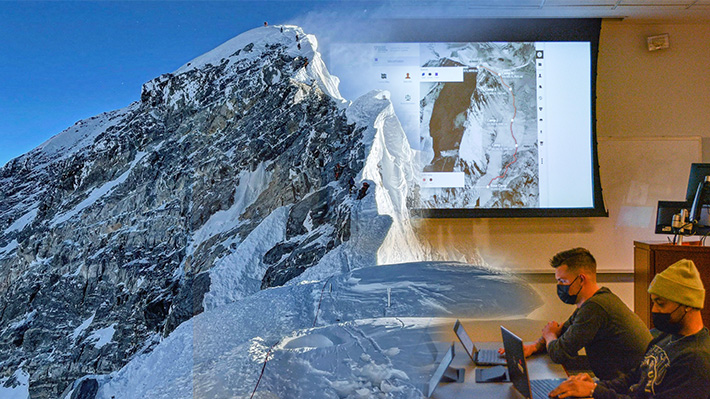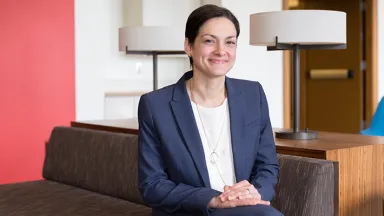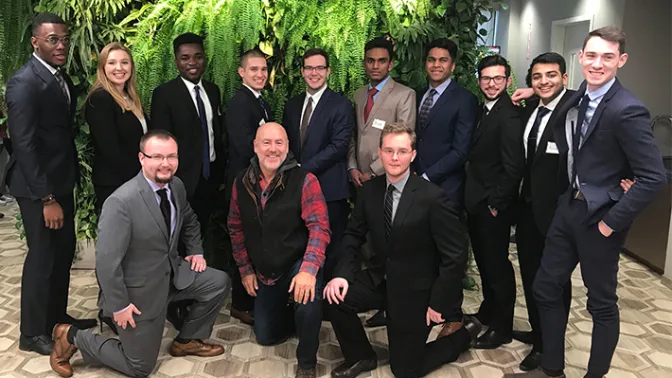
Learning to Lead Through a Climb to the Top
What did famed mountain climber Edward Mallory say, when asked why he wanted to climb Mount Everest? “Because it’s there.”
Mallory wasn’t successful in reaching the summit of the world’s tallest mountain, but his spirit has inspired those who seek out challenges – mountainous ones and others – for nearly a century.
The feat of climbing Everest is the basis for a leadership development simulation created by Harvard Business School that’s now part of Organizational Behavior (ORGB 300), a required course for all BSBA students at LeBow. First launched at LeBow in fall 2020, the web-based simulation is an exciting way of applying course material on leadership approaches and styles: a combination of the classic Oregon Trail computer game and an escape room, with time pressure compounding the decisions that each team and each individual must make.
Each class splits up into teams of five, with a persona assigned to each member: the leader, a physician, a photographer, an environmentalist and a marathoner, each with their own goals and varying levels of experience with mountaineering. The simulated climb has six stages, with varying amounts of time for each team member input their individual decisions about whether to advance to the next stage while considering various data points the simulation produces: weather conditions, their hiking speeds and their health levels, including oxygen rates and risk of frostbite.
After completing the simulation, team members learn their fates – did they reach the summit or have to be rescued? – and the teams are scored on how many goals they met and how they performed in various challenge scenarios.
Brandon Leiva, a third-year student majoring in legal studies and sport business who had the physician role on his team, said that figuring out those challenges was the most difficult part, but he was encouraged by his team’s overall performance.
“We needed to find the best combination of goals that would give us the highest number of points, and sometimes that required other members to sacrifice a goal or two for the good of the team,” he said. “To be on a team, you need the ability to put aside your individual feelings and do what is best for everyone.”
PhD candidate in management Stacy Boyer oversees the simulation, along with fellow PhD candidate So Young Choi. Boyer notes that both the course and the simulation focus on team dynamics, especially the interdependence of individual roles with overall team goals, and this often requires making tradeoffs and balancing competing priorities.
“Students enjoy the interactive experience, and for some, this is their first opportunity to reflect on and develop their own leadership and teamwork skills in the classroom,” she says. “The simulation isn’t in a business setting, but they can take everything they learn and apply it to other teamwork and workplace scenarios.”
As Boyer ran the simulation sessions during winter term, she also gathered student data for her dissertation through short surveys taken before, during and after the team simulation that address different aspects of the team leaders’ and team members’ experiences. Through the surveys and in a debriefing session after the simulation, both Boyer and the students gain insights into how leadership styles affect their tasks, teammates and goals.
“That reflection component is really important in working out what went well and what they could have done differently,” Boyer says. “In doing this, they can identify their own leadership styles.”
The simulation is also a key component to the Chapel Leadership Program, launched in 2020 through a generous gift from R. John Chapel Jr ‘67, and his wife, Jinnie, and established as a formal leadership track within LeBow’s undergraduate programs.
Associate Professor of Management Mary Mawritz, PhD, who serves as faculty advisor for the program along with Associate Professor of Management Wendy van Ginkel, PhD, notes that the simulation exemplifies her department’s focus on leadership.
“From the faculty to the PhD students to undergraduates majoring in organizational management, we all have a leadership element to what we do,” she says. “Leadership components like teamwork, communication and problem-solving are sometimes called ‘soft skills,’ but they’re important ones, and increasingly, organizations look for new hires to come in with those skills.”
Learn more about the Chapel Leadership Program, including requirements and how to apply.



